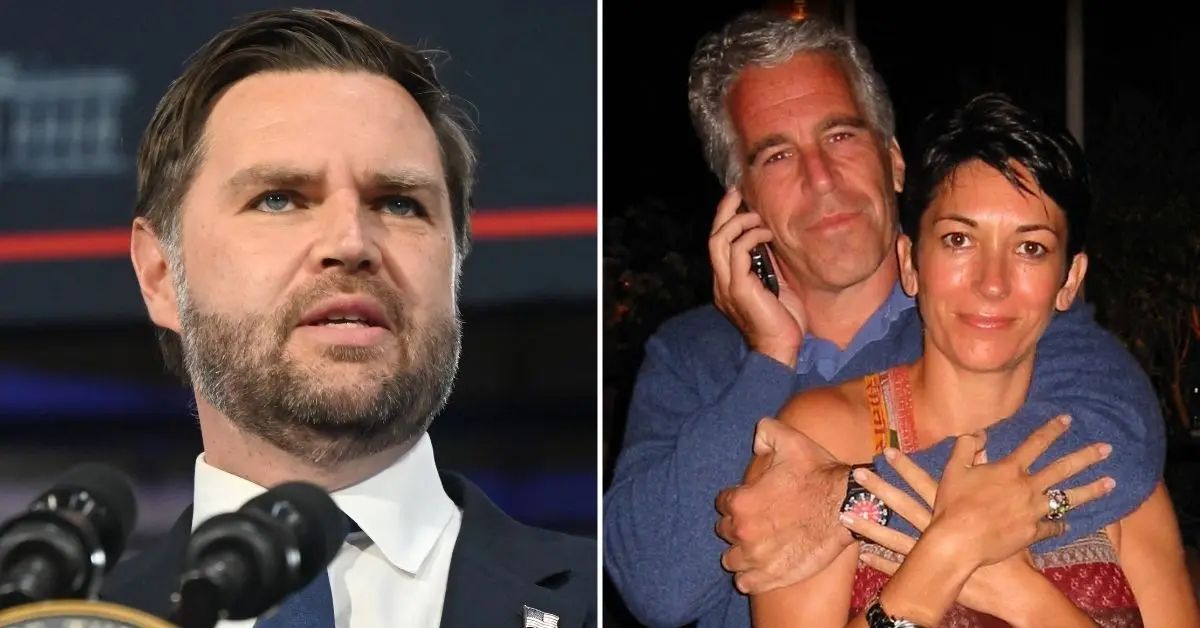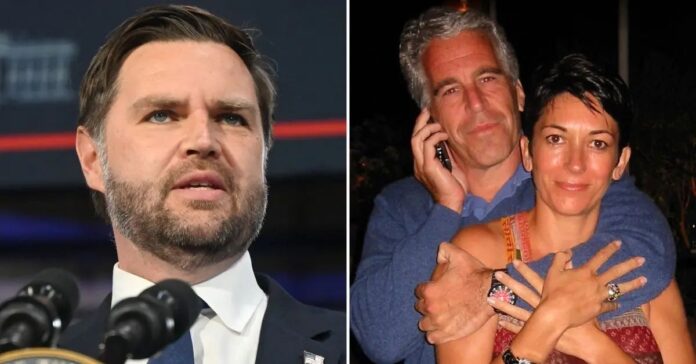😱 JD Vance just made a JAW-DROPPING mistake about Epstein ties that’s left the world STUNNED! 🌎 What did he say that he CAN’T take back? This is HUGE! 👀

In a moment that has sent shockwaves through political circles and social media, Vice President JD Vance reportedly made a stunning verbal misstep regarding Jeffrey Epstein’s ties to powerful figures, reigniting a firestorm of controversy. The headline “JD Vance Accidentally SLIPS UP With Stunning Mistake Over Epstein Ties, and The Whole World Is In Shock” has gone viral, capturing the attention of millions and fueling speculation about what exactly Vance said and why it matters. This incident, occurring amid ongoing debates about transparency in the Epstein case, underscores the fragility of political rhetoric and the amplifying power of the digital age. In this article, we delve into the context of Vance’s alleged mistake, its implications, and the broader questions it raises about truth, accountability, and public perception in American politics.
The Context of the Slip-Up
The exact details of JD Vance’s statement remain elusive, as the viral narrative has outpaced verified reporting. According to sources like Newsweek and The Independent, Vance’s comment came during a Fox News interview on Sunday Morning Futures with Maria Bartiromo on August 10, 2025, where he discussed the Epstein case. Vance, a staunch defender of President Donald Trump, attempted to shift blame to Democrats, stating, “We know that Jeffrey Epstein had a lot of connections with left-wing politicians and left-wing billionaires.” However, the viral framing suggests he inadvertently said something incriminating or contradictory, possibly implicating himself, Trump, or others in a way that reignited scrutiny over the Epstein files.
The Epstein case, involving the late financier and convicted sex offender who died by suicide in 2019, remains a lightning rod for controversy. Public fascination with Epstein’s connections to wealthy and powerful figures has fueled demands for transparency, with many believing the unreleased files hold incriminating evidence. Vance’s prior comments, such as a 2021 X post questioning why Epstein’s elite ties were never fully investigated, have resurfaced, adding to the perception of a misstep. His recent claim that the Trump administration is committed to “full transparency” contrasts with the Justice Department’s July 2025 memo stating no further disclosures were warranted, creating a backdrop of skepticism.
The “slip-up” likely stems from Vance’s attempt to deflect criticism while addressing a sensitive topic. Posts on X, such as those from @PoliticsxPop and @IfICouldFly369, suggest he may have overstated or mischaracterized Epstein’s connections, inadvertently drawing attention to Trump’s own documented ties to the financier. Without a full transcript, the exact nature of the mistake remains speculative, but its viral spread indicates it struck a nerve with audiences.
Why the Moment Went Viral
The viral nature of Vance’s alleged slip-up lies in its dramatic framing and the public’s hunger for accountability in the Epstein saga. The headline’s use of “stunning mistake” and “whole world in shock” taps into emotional triggers like surprise and outrage, which a 2020 MIT study found drive higher engagement online. The Epstein case, with its web of elite connections and unanswered questions, is a perfect storm for virality, as it combines scandal, power, and mystery. Vance’s comment, whether a genuine error or a media exaggeration, fits this narrative, amplifying its reach.
Social media platforms, particularly X, have fueled the story’s spread. Posts like those from @WorldOfGaia5Art and @LaporteSondra, linking to YouTube videos titled “JD Vance LETS IT SLIP in Shocking Epstein Answer,” have garnered significant attention. These posts frame Vance’s statement as a bombshell, encouraging clicks with minimal context. The lack of clarity about what he said—whether a factual error, a Freudian slip, or a misinterpreted remark—only heightens curiosity, driving users to seek answers.
The moment also resonates because of Vance’s high-profile role as Vice President and his past advocacy for Epstein transparency. His 2021 X post, “Remember when we learned that our wealthiest and most powerful people were connected to a guy who ran a literal child sex trafficking ring?” contrasts sharply with his recent defense of the Trump administration’s handling of the case, leading to accusations of hypocrisy. This contradiction, real or perceived, fuels the narrative of a “slip-up” that exposes hidden truths.
The Broader Issue of Transparency in the Epstein Case
Vance’s alleged mistake highlights a central issue: the public’s demand for transparency in the Epstein case and the political challenges of delivering it. Epstein’s connections to figures like Bill Clinton, Donald Trump, and Bill Gates, as noted in unsealed 2024 court documents, have kept the case in the spotlight. The Trump administration’s decision to limit further disclosures, citing no “client list” or blackmail material, has frustrated supporters who expected action, especially after promises from figures like FBI Director Kash Patel to “roll out the black book.”
Transparency in high-profile cases like Epstein’s is fraught with challenges. Releasing documents risks exposing victims’ identities, as Vance himself noted when defending the administration’s caution. Yet withholding information fuels conspiracy theories, as seen in reactions from figures like Elon Musk, who accused Trump of suppressing files due to personal involvement. A 2021 USC study found that misinformation spreads six times faster than accurate information online, and the Epstein case exemplifies this, with speculation often outpacing facts.
Vance’s slip-up, whether substantive or exaggerated, underscores the political tightrope of addressing such cases. Politicians must balance transparency with legal and ethical considerations, all while navigating public skepticism. A 2023 Gallup poll showed only 17% of Americans trust Congress, reflecting a broader erosion of faith in institutions that makes moments like Vance’s resonate as potential evidence of cover-ups.
Implications for Vance and the Trump Administration
For JD Vance, the slip-up could damage his credibility, particularly among the MAGA base that once championed his calls for Epstein accountability. His 2021 X post and 2024 interview with Theo Von, where he demanded the release of the “Epstein list,” set expectations that the administration has failed to meet. Critics like podcaster Theo Von have called out Vance’s shift, asking, “What changed?” This perception of inconsistency could weaken Vance’s standing as a rising star in the Republican Party.
For the Trump administration, the incident adds fuel to an already contentious issue. Trump’s own ties to Epstein, including a reported “bawdy” letter sent for Epstein’s 50th birthday, have drawn renewed scrutiny. Vance’s attempt to deflect by pointing to “left-wing” connections may have backfired, as critics like Jon Favreau and Kevin Kruse argue it distracts from Trump’s own associations. The administration’s handling of the Epstein files, including moving Ghislaine Maxwell to a Texas prison and weighing a pardon, only deepens public suspicion.
The Role of Media and Public Perception
The viral framing of Vance’s slip-up highlights the media’s role in shaping narratives. Sensational headlines amplify minor moments, often at the expense of nuance. A 2019 study in the Journal of Communication notes that emotionally charged stories drive engagement but can distort reality. In this case, the lack of a verifiable transcript allows speculation to flourish, with X users like @Michell33650674 accusing Vance of being “fully complicit” in a cover-up. Media outlets must balance attention-grabbing headlines with responsible reporting, while the public needs better media literacy to separate fact from hype.
Toward a More Transparent Political Discourse
To address the issues raised by this incident, leaders like Vance must prioritize clarity and consistency. Acknowledging past statements, like his 2021 call for an Epstein probe, and explaining shifts in stance could rebuild trust. The administration could also release redacted documents to balance transparency with victim protection, as suggested by commentator Bill Kristol.
Voters, meanwhile, should seek primary sources and question viral narratives. Fact-checking resources like PolitiFact can help, but critical thinking is key. A 2022 Brennan Center report emphasizes the importance of public engagement in holding leaders accountable without succumbing to polarization.
Conclusion
JD Vance’s alleged slip-up over Epstein ties is a microcosm of the challenges facing American politics: a demand for truth, the pitfalls of rhetoric, and the amplifying effect of social media. Whether his mistake was a genuine error or a media-driven frenzy, it has reignited public fascination with the Epstein case and raised questions about accountability. As the Trump administration navigates this controversy, the path forward lies in transparency, dialogue, and a commitment to facts over sensationalism.
